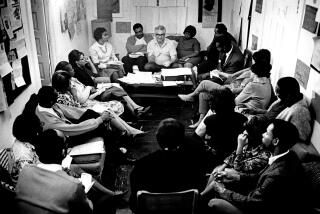James Welch, 62; His Books on American Indian Issues Won Critical Acclaim
- Share via
James Welch, the eminent Native American novelist whose books dealing with American Indian life and issues brought him international acclaim, has died. He was 62.
Welch, who had battled lung cancer since October, died Monday of a heart attack at his home in Missoula, Mont.
The Montana-born author of seven books burst onto the literary scene in 1974 with the publication of his first novel, “Winter in the Blood.”
The book, which is narrated by a young Indian who lives on a ranch on a reservation in north central Montana, garnered a front-page review in the New York Times Book Review by novelist Reynolds Price, who called it a “nearly flawless novel about human life.”
“That book was so brilliant in technique that it really took Native American writing to a new level,” Bill Bevis, a retired University of Montana literature professor, told The Times on Wednesday.
“Riding in the Earthboy 40,” a collection of his poems dealing with Indian subjects, was published in 1971. Welch’s first novel reflected his poetic sensibilities.
“ ‘Winter in the Blood’ was so poetic and the images were so exact, and it was an unflinching look at life on a Montana reservation,” Bevis said. “So it was a great combination of poetic technique and hard realism.”
Welch turned to historical fiction for his 1986 novel “Fools Crow.” The story of a band of Blackfoot Indians in the Montana Territory of the 1870s earned Welch the Los Angeles Times Book Prize for fiction.
Montana-born novelist Ivan Doig, who was asked to write a book jacket blurb for “Fools Crow,” remembers that after reading a galley of the novel, “It became clear what Jim’s standing was among my generation of Western writers.”
In that book, Doig told The Times on Wednesday, “Jim managed to, I think, enter the soul of the people of the Blackfoot tribe. That seemed to be the single, greatest imaginative leap into a people that any of us writing here in the West have managed.”
Welch turned to nonfiction with his 1994 book “Killing Custer: The Battle of the Little Bighorn and the Fate of the Plains Indians,” an account of the famous 1876 battle as seen from the Indian perspective.
His last book, “The Heartsong of Charging Elk,” was published in 2000. Loosely based on a true story, its protagonist is a young Oglala Sioux man who joined Buffalo Bill’s Wild West Show and remained in Marseilles, France, after being injured on his horse while touring with the show in Europe.
“Jim as a writer was an empiricist,” Pulitzer Prize-winning author Richard Ford, a part-time Montanan who first met Welch 20 years ago, told The Times on Wednesday. “He went out into the world and brought the world to the page and was a wonderfully euphonious and felicitous writer.
“Jim was also purely a writer. I don’t think he had any vocational interests besides being a writer.”
Ford said Welch, who was known for his wry wit, “was a truly happy man.
“One of the things I liked about him is when you met him you met a regular guy. You didn’t meet an artiste, although his work was high art.”
Novelist Jim Harrison, another longtime friend, said Welch had been on his top-five list of living American novelists.
“Jim was an inordinately substantial writer, almost in a 19th-century sense,” Harrison told The Times on Wednesday. “He had a solidity of storytelling skills that were utterly amazing.”
Welch, who developed an international following, was a recipient of France’s Chevalier of the Order of Arts and Letters.
And yet Harrison believes that, despite his success and accolades, Welch didn’t get his “due recognition” from the East Coast literary establishment.
“His material is not in the New York frame of reference,” Harrison said. “I’d guess that most of his audience was west of the Mississippi. It’s the old problem of [East Coast] xenophobia -- that they’re not very interested in the kind of things that Jim wrote about.”
Welch, who was part Blackfeet and Gros Ventre Indian and Irish, was born Nov. 18, 1940, on the Black Feet Reservation in Browning. His great-grandfather on his father’s side had played coronet in John Philip Sousa’s band before becoming an Indian agent in Browning.
Welch belonged to the Black Feet tribe and spent his early years living on the isolated reservation, said Lois, his wife of 35 years and a retired professor of comparative literature at the University of Montana.
Encouraged to write poetry by a high school English teacher, Welch earned a bachelor’s degree in English from the University of Montana in Missoula in 1964. He then studied under poet Richard Hugo in the university’s master’s program.
But after what he characterized as a less-than-distinguished undergraduate career, Welch once wrote, he realized he was in way over his head.
At one point, Hugo took him aside and said, “You don’t know anything about poems, do you?”
“I sat for a moment trying to think up a defense for my story, but nothing came to me, so I said, ‘No,’ ” Welch recalled. “To my surprise, Hugo said, ‘That’s OK. What do you know about?’ ”
Welch then told Hugo about his life growing up on the reservation, and Hugo told him to write about that.
Although he taught sporadically as a visiting teacher at universities -- he also served on the Montana State Board of Pardons from 1979 to 1989 -- Welch viewed himself strictly as a writer.
“At times,” Lois Welch said, “He’d say, ‘Well, I wasn’t good at anything else.’ ”
Writing, she said, “in a sense, meant everything to him.”
In addition to his wife, Welch is survived by his father, James P. Welch Sr. of Great Falls, Mont.; and two brothers, Tim of Billings, Mont., and Michael of Chico, Calif.
More to Read
Sign up for our Book Club newsletter
Get the latest news, events and more from the Los Angeles Times Book Club, and help us get L.A. reading and talking.
You may occasionally receive promotional content from the Los Angeles Times.









